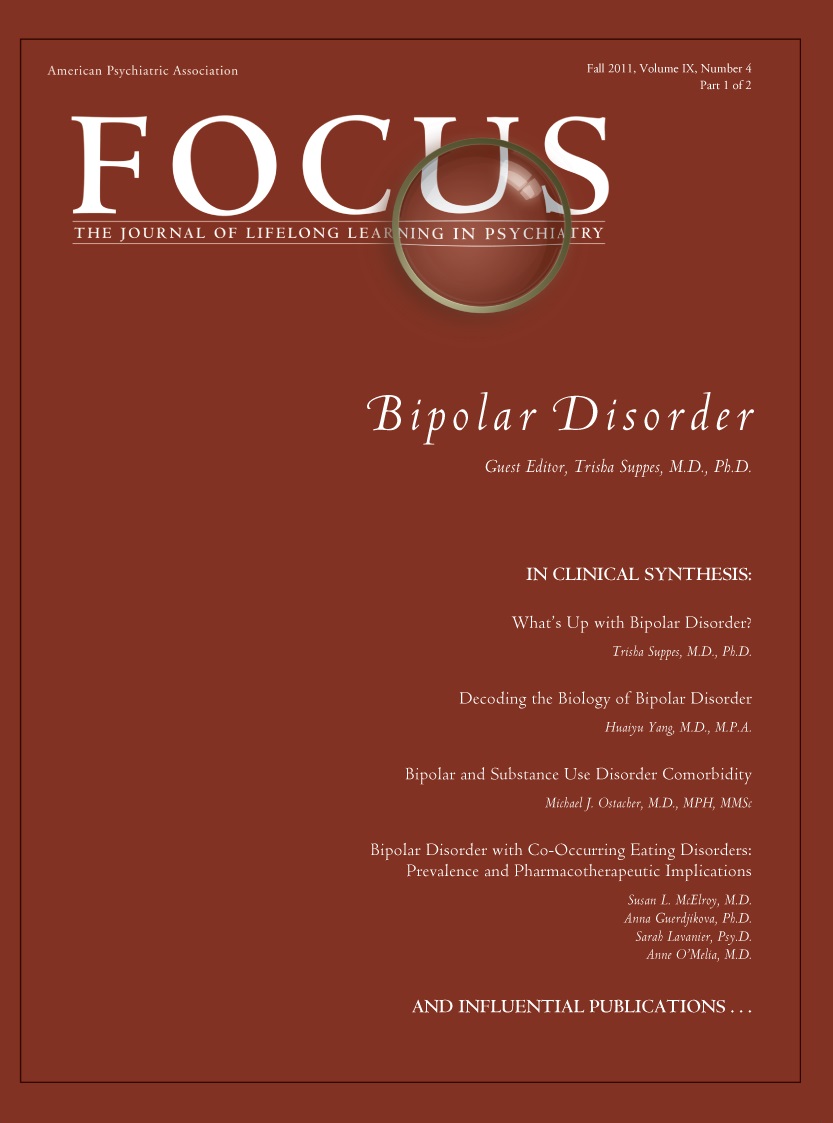Pharmacotherapy
The two primary questions in treatment of patients with bipolar disorder and cooccurring substance use disorders are the following: what treatments reduce the use of substances and what treatments for bipolar disorder are effective in this group? There are remarkably few published data to answer either question, and this is in part due to the difficulty in identifying and enrolling such subjects in trials (presumably those most affected are not seeking treatment) and in part due to greater focus on the part of pharmaceutical manufacturers (who invest the greatest amount of money in efficacy trials) on wider markets, i.e., general populations with bipolar disorder and not subgroups of patients. We can review available evidence.
It is best to exclude small, exploratory, and underpowered trials in discussions regarding the care of patients. These studies might inform further research, but the probability of there being false-positive findings with inadequate assessments of safety prohibit their discussion is such a setting. Despite this limitation, clinicians want to provide the most appropriate care for their patients, and because most efficacy trials exclude subjects with dual diagnoses, some guidance is still merited.
There are no replicated, adequately powered trials of any compounds in the treatment of substance use disorder in patients with bipolar disorder. The largest study of any treatment for this population was undertaken by AstraZeneca. Stedman et al. (
42) studied quetiapine compared with placebo added to lithium or divalproex sodium in 362 subjects with co-occurring alcohol dependence and bipolar disorder, replicating a finding by Brown et al. (
43). Despite quetiapine's having been repeatedly shown to be effective in multiple phases of bipolar disorder, these studies found no benefit for quetiapine for the primary drinking outcome and no clinically significant benefit for mood (
44).
Maintenance treatment with sodium divalproex added to lithium for subjects with alcohol dependence and bipolar disorder decreased heavy drinking compared with placebo (
45). This modestly sized randomized trial suggests that the addition of valproate may be of some benefit for such patients; although not replicated, the addition of valproate to lithium in patients with co-occurring disorders who have an inadequate response to lithium is consistent with current findings for bipolar disorder in general, so may be recommended (
46). No other treatment specific to bipolar disorder has been shown to be effective in the treatment of any substance use disorder in patients with bipolar disorder.
Several treatments that have been shown to improve outcomes for substance use disorders have been studied in bipolar disorder, but none has unequivocally shown benefit. For alcohol dependence, there are two small studies of naltrexone and acamprosate in subjects with bipolar disorder, each of which finding a nonstatistically significant affect in favor of drug over placebo, but these studies were preliminary and underpowered (
47,
48). Disulfiram, the other Food and Drug Administration (FDA)-approved treatment for alcohol dependence, has not been studied in bipolar disorder, and a trial of topiramate, a
N-methyl-d-aspartate and glutamate modulator that has shown efficacy in decreasing heavy drinking in a nonpsychiatrically ill population, is currently under study (
49,
50). No treatment for opiate dependence has been studied in bipolar disorder, and treatments for cannabis, stimulant, or cocaine dependence in bipolar disorder have not been studied in adequately powered, well-designed studies to be able to recommend them. (No treatment is FDA-approved for the treatment of cannabis, stimulant, or cocaine dependence.)
Despite this lack of clear data, it is reasonable to recommend that effective treatments for bipolar disorder should be used in all patients with bipolar disorder, regardless of comorbidity. The data suggesting that drug and alcohol use disorders in observational studies do not affect outcome for mood prospectively suggest that standard treatment is as effective for these patients and for patients without substance use disorder comorbidity; bipolar disorder is difficult to treat for the majority of patients in any case.
It is perhaps more difficult to determine whether to use substance use disorder-specific treatments in patients with bipolar disorder in the absence of evidence for their use. There is no reason to believe, for instance, that opiate substitution or nicotine replacement therapy would not be effective for patients with bipolar disorder, at least to some degree; the consequences of opiate and nicotine dependence on morbidity and mortality are undeniable, so withholding treatment for them because of a bipolar disorder diagnosis seems more risky rather than less. The standards of care for those disorders should be used first. Bupropion, although not effective for the treatment of bipolar depression, has not been shown to worsen mood outcomes in patients also taking an antimanic drug. Thus, although its efficacy in smoking cessation in bipolar disorder is not established, its safety may be assumed (
51). For varenicline, however, decision-making is more difficult, because that drug is perceived to be associated with significant psychiatric side effects (although whether this is actually the case has not been established) (
52). Because its safe use in bipolar disorder has not been established, clinicians should proceed with extreme caution if prescribing it.
As is also the case with anxiety disorders, the infrequent use of pharmacological treatments for addiction in patients with bipolar disorder is striking (
53). There may be a perception that addictions are less severe in individuals with bipolar disorder than in the general population (this has not been established) and that substance use will improve with adequate treatment for mood. There is no evidence for this, and because in practice many patients with bipolar disorder remain symptomatic or have frequent relapses, this may be an unrealistic hope. Even in substance abuse treatment settings, the use of medical treatments for addictive disorders is still not widespread (
54). However, the health consequences of continued abuse of substances may merit their use even though specific evidence of efficacy in bipolar disorder is lacking.

